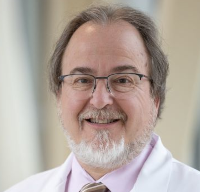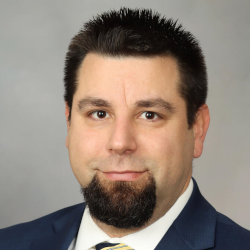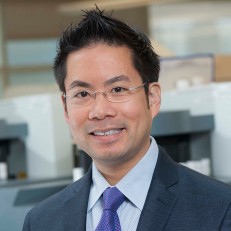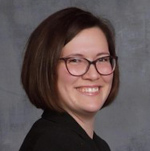DPAI 2023 Faculty
Omar Z. Baba, M.D. is a Pathology Informatics Fellow at Henry Ford Health, Detroit, mentored by Dr. J. Mark Tuthill. A Clinical Pathologist trained at the American University of Beirut Medical Center in Lebanon, he has been at the forefront of pathology informatics, deeply engaged in multiple informatics operations at the department of Pathology and Lab medicine at HFH and notably leading a validation initiated on an AI-driven image analysis tool, which he presented at the 2023 PI Summit in Pittsburgh. Areas of interest include digital pathology implementation, business analytics, electronic health records/ laboratory information systems, and informatics training and education. Alongside these technical pursuits, Dr. Baba is deeply involved in academia, playing pivotal roles in various committees (API and PIER Leadership committee), and holding memberships with DPA, ASCP, and API. Outside of his professional realm, he spends time creating graphic art, watching TV series, traveling, attending group exercise classes, hunting fine dining and desert spots, but most importantly spending quality time with family and friends.CLOSE

Assistant Attending Pathologist
Molecular Diagnostics Service
Memorial Sloan Kettering Cancer Center
Jamal is a molecular pathologist at Memorial Sloan Kettering. He received his BS in Computer Science and Bioinformatics at UC San Diego and his MD at The University of Chicago after which he went on to do his AP, and CP residency at UC San Francisco and then his MGP and Clinical Informatics training at Memorial Sloan Kettering where he then joined the faculty in the Department of Pathology and Laboratory Medicine. His work has focused on clinical informatic education course development and the validation and clinical deployment of artificial intelligence based clinical assays using genome-wide methylation data.CLOSE

Angella Coffee, HTL(ASCP) is the department supervisor for histology at M Health Fairview. Her interests include integration of whole slide imaging into histology operations and growth of the digital pathology practice at M Health Fairview.CLOSE

Bryan Dangott, MD is the Director of Clinical Informatics and a Consultant in the Department of Laboratory Medicine and Pathology at Mayo Clinic Florida. Current research interests include digital pathology adoption, optimizing workflow efficiency, operational analytics, image analysis, and AI software development. In prior roles he served as Vice Chair of Pathology Informatics and Analytics at East Carolina University and as Medical Director for Flagship Biosciences and Interpace Pharma Solutions. CLOSE

Co-Chair of DP-AI Planning Committee
Chair of Pathology Indiana University
Indiana University
My professional interests revolve around the development, integration and adoption of information technologies in the discipline of Pathology. One of my main areas of interest within this broad discipline has been in the field of digital imaging. We have been studying pathology imaging on several fronts including interactions between pathology/radiology (Radiopathogenomics of prostate cancer and breast carcinoma), development and utilization of computer assisted diagnostic algorithms for machine vision in prostate and breast cancer. More recently we have been developing deep learning methods for complex interrogation of pathology slides both within the cancer domain as well as in cardiovascular and renal pathology.
I am also interested in solid tumor minimal residual disease. In this area we have been studying disseminated tumor cells (DTC) in the bone marrow of high risk breast cancer patients. Using flow cytometry our group has developed high throughput flow to elucidate residual tumor burden in these patients. Randomized clinical trials are now in place to target these cells focusing on autophagy, MTOR and cMET pathways to interrupt these pathways that have been shown to play a role in DTC survival in both animal models as well as single cell sequencing studies in these high risk patients. My research and technology interest is still focused on bringing technology and tools out to clinical care but has widened to now thinking about this at the enterprise level and how to accommodate a wider range of needs, interests, capabilities and varying enthusiasm for change. CLOSE 
Dr. Chris Garcia is the Medical Director in the Division of Computational Pathology and Artificial Intelligence at the Mayo Clinic. He is a pathologist (AP/CP) with subspecialty training in Pathology Informatics. He has over 10 years experience in working in industry (Philips Digital Pathology Solutions), for reference laboratories (Labcorp as a medical director and strategic director) and academic medicine (currently at the Mayo Clinic). He is actively involved in the digital pathology and pathology informatics communities. He currently focuses on developing and integrating AI/ML solutions into clinical operations and practice in Laboratory Medicine and Pathology. CLOSE

Pathologist at NorthShore University HealthSystem
Director of Informatics, Innovation and Technology
John Groth, M.D., is a pathologist at NorthShore University HealthSystem, where he is currently the director of informatics, innovation and technology and leading the efforts of a transition to a digital workflow with the incorporation of artificial intelligence, for primary anatomic pathology clinical work and establishing a pathology clinic. He completed his undergraduate studies in chemistry at the University of Virginia and medical school studies at the University of Illinois at Chicago. He completed his anatomic and clinical pathology residency and subsequent fellowships in general surgical pathology with interests in digital pathology, education, gynecologic pathology, laboratory information systems, patient and pathologist safety, and quality, as well as a cytopathology fellowship, from the University of Illinois at Chicago. He is board-certified in anatomic, clinical and cytopathology and is seeking board certification in clinical informatics via the practice pathway. He is currently: a member of the Digital Pathology Association's Regulatory & Standards Task Force, a member of the American Society of Clinical Pathology's Patient Champions Committee, a member of the NorthShore University HealthSystem Digital Health Committee, vice president of the Illinois Society of Cytotechnology, and treasurer of the Chicago Pathology Society. Dr. Groth has been recognized for his academic, educational, mentorship and scholarly efforts and is passionate about the betterment of patient care and pathology practice for improved outcomes. In his talk, he will explore how the fusion of digital transformation and direct patient care in pathology is reshaping patient journeys and redefining our roles as pathologists. Through real-world cases, he will unveil how patient interactions during clinic visits guide these journeys. Discover actionable insights to navigate the balance between innovation and compassionate care, all centered on enhancing the patient and pathologist experience. CLOSE
Associate Professor of Biomedical Informatics
Division of Computational Pathology and AI
Mayo College of Medicine
Dr. Steven N. Hart is a seasoned bioinformatics expert with a proven track record of leveraging scientific computing technologies to drive innovation in healthcare. As the architect behind GenomeGPS, the primary DNA sequencing workflow at Mayo Clinic, he demonstrated his exceptional skills in building complex technologies and managing large-scale sequencing projects.
Dr. Hart is a Google Cloud Professional Certified Architect, highlighting his expertise in cloud computing and data management. He applied this knowledge to transform the genomics data processing landscape at Mayo Clinic, where he served as the Associate Director of Bioinformatics. His leadership in the Clinical Genome Sequencing Laboratory has propelled the integration of cutting-edge research into clinical practice. An accomplished researcher, Dr. Hart has authored over 100 peer-reviewed papers in high-impact journals, underscoring his significant contributions to the field of bioinformatics. He excels in cancer genomics, inherited cancer risk, and AI in digital pathology. His AI algorithms are directed toward minimizing unnecessary tests and identifying those who would benefit from genetic predisposition testing. With a patient-centric approach, Dr. Hart is at the forefront of bringing new high-throughput technologies into clinical practice. His work in AI, ML, and cloud computing is shaping the future of digital healthcare, making him an ideal candidate for leadership roles in healthcare informatics.CLOSE 
Consultant, Division of Anatomic Pathology, Department of Laboratory Medicine and Pathology
Professor of Laboratory Medicine and Pathology
Mayo Clinic
Dr. Maleszewski is Professor of Laboratory Medicine & Pathology and Professor of Medicine in the Department of Laboratory Medicine & Pathology at Mayo Clinic. He is the Section Head of Cardiovascular Pathology and is jointly appointed in the departments of Cardiovascular Medicine and Clinical Genomics. Additionally, he serves as the Senior Associate Dean for Academic Affairs in the Mayo Clinic Alix School of Medicine. Dr. Maleszewski has over 250 peer-reviewed manuscripts and has published over 100 book chapters. He has edited 2 major texts, including the upcoming Fascicle on Cardiovascular Diseases. He serves as an editor for the WHO’s Blue Book on Tumors of the Heart, Lung, Mediastinum and Pleura. Dr. Maleszewski lectures all over the world and is a passionate and dedicated educator. He is most proud of the many trainees in pathology, cardiology, and radiology that he has had the privilege to with work with and learn from.CLOSE

Chair, Division of Computational Pathology and Artificial Intelligence
Senior Associate Consultant, Department of Laboratory Medicine and Pathology
Mayo Clinic Dr. David McClintock is Chair of the Division of Computational Pathology and Artificial Intelligence and a Senior Associate Consultant in the Department of Laboratory Medicine and Pathology, at the Mayo Clinic (Rochester). Current professional interests include the use of machine learning and artificial intelligence tools to improve patient care, clinical laboratory workflows, operational efficiency, and scientific discovery. He is currently the Program Committee Chair within the Association for Pathology Informatics. CLOSE

Heather Morris has been a medical laboratory scientist (MLS) and technical specialist in the Mayo Clinic Clinical Parasitology lab for more than 20 years. She is an instructor in Clinical Parasitology for the Mayo Clinic College of Medicine and Science and plays an active role in the education of clinical microbiology fellows, Infectious diseases fellows, pathology residents, and MLS students. She received her Clinical Laboratory Science degree from the University of Kansas Medical Center. She is experienced in all clinical laboratory diagnostics and procedures, including stool and blood parasitic examination, advanced parasitologic procedures, and the identification of macroscopic parasites. Most recently, she evaluated and implemented an artificial intelligence algorithm for identification of protozoan parasites in stool specimens. CLOSE
Dr. Olga Pozdnyakova is an Associate Professor of Pathology at Harvard Medical School and a Diagnostic Hematopathologist at Brigham and Women’s Hospital and Dana Farber Cancer Institute. She also serves as the Medical Director of the Hematology laboratory at Brigham and Women’s Hospital, MassGeneralBrigham Flow Cytometry Integrated Laboratory, and Physician Diagnostics Labs at the Brigham and Women’s Harbor Medical Associates. Originally from Moscow, Russia, Dr. Pozdnyakova studied medicine at the Russian State Medical University. Dr. Pozdnyakova was trained in Anatomic and Clinical Pathology at the University of Massachusetts Memorial Medical Center and Hematopathology at Brigham and Women's Hospital. Dr. Pozdnyakova is an author of over 100 peer-reviewed publications and reviews. She has authored chapters on the topic of myeloid neoplasm in several fundamental pathology textbooks, such as Diagnostic Histopathology of Tumors, Wintrobe’s Atlas of Clinical Hematology, Diagnosis of Blood and Bone Marrow Disorders and Diagnostic Bone Marrow Hematopathology. Dr. Pozdnyakova is also a co-author of textbook Hematopathology: A Volume in the High Yield Pathology Series. She serves on the editorial boards of the American Journal of Clinical Pathology and the International Journal of Clinical Hematology, in addition to being a Vice-Chair of the College of American Pathologists Hematology and Clinical Microscopy Committee. Dr. Pozdnyakova has presented at numerous national and international pathology meetings and courses.CLOSE

Associate Attending
Director of Pathology Informatics
Memorial Sloan Kettering Cancer Center
I am board-certified in clinical informatics, in addition to anatomic and clinical pathology. I serve as Director of Pathology Informatics and a member of the Warren Alpert Center for Computational Pathology.
I am a recognized expert and leader in digital and computational technologies. My work focuses on the “operationalization” of digital pathology, artificial intelligence (AI), and efforts in data engineering. I am the past 2021 President of the Association for Pathology Informatics. Likewise, I actively participate in other national committees to enable digital and computational technologies and data initiatives to steer national strategic direction and policy. CLOSE 
Associate CMIO for Lab Medicine and Pathology
MHealth Fairview, University of Minnesota
Dr. Stoffel practices laboratory medicine and pathology informatics full-time as the Associate CMIO for Laboratory Medicine and Pathology Informatics at the University of Minnesota/M Health Fairview in Minneapolis, Minnesota. She has previously served on the API Membership Committee and PI Summit Topic Selection Committee, and has served with the College of American Pathologists as a junior member of the Center Committee and as a Foundation Informatics Travel Award reviewer. Her specialty interests are bridging communications between the lab, clinicians, and patients; and engaging pathology-trained learners of any role in informatics projects and education. CLOSE

Associate Consultant
Division of Computational Pathology and Artificial Intelligence
Mayo Clinic
Dr. Thomas Erol Tavolara is an Associate Consultant in the Department of Laboratory Medicine and Pathology at Mayo Clinic in Rochester MN. Dr. Tavolara serves in the Division of Computational Pathology and Artificial Intelligence. Dr. Tavolara received his PhD in Biomedical Engineering at Wake Forest University where his research focused on histopathological image analysis, whole slide image analysis, medical image analysis, AI interpretability, self-supervision, and weak-supervision. Dr. Tavolara’s current clinical and research interests focus on developing tools for computational pathology and leading development of LLM-based tools.CLOSE

Senior Associate Consultant
Department of Laboratory Medicine and Pathology
Mayo Clinic
Dr. Patrick M. Vanderboom, Ph.D. is a Senior Associate Consultant in the Department of Laboratory Medicine and Pathology at Mayo Clinic in Rochester MN. At Mayo Clinic, Dr. Vanderboom currently serves as the Director of Clinical Informatics for the Division of Clinical Biochemistry and Immunology. Dr. Vanderboom received a master’s degree from Mayo Clinic Graduate School in Molecular Pharmacology, a Ph.D. in Bioinformatics and Computational Biology from the University of Minnesota and has completed a fellowship in Clinical Chemistry at Mayo Clinic. Dr. Vanderboom’s current clinical and research interests focus on improving laboratory test performance through the application of informatics-based tools.CLOSE

Vice Chair, SaMD Regulatory
Center for Digital Health - Data and Analytics
Mayo Clinic
David Vidal, J.D. joined Mayo Clinic in 2020. He is an attorney and the Vice Chair for Software as a Medical Device (SaMD) Regulation in Mayo Clinic’s Center for Digital Health - Data & Analytics leadership. His team is leading the development of enterprise-wide infrastructure to enable safe, effective, and ethical realization of FDA regulated artificial intelligence (AI) and software solutions. David specializes in navigating product regulatory strategy and design controls for AI and software-based product teams. David also advises on SaMD compliance, federal regulations, and standards for AI and software frameworks. David previously held the position of General Counsel and Senior VP of Quality Assurance & Regulatory Affairs at IDx Technologies Inc., where he played an instrumental role in the FDA authorization and deployment of IDx-DR, the first autonomous AI diagnostic cleared by the FDA. CLOSE

Mayo Clinic
Dr. Zarella is a Senior Associate Consultant in the Division of Computational Pathology and AI. Previously, he was the Director of Digital Pathology at Johns Hopkins and has worked in the areas of digital pathology, AI, and informatics for over ten years. He is a board member of the Digital Pathology Association and serves on the Digital and Computational Pathology Committee for the CAP. His interests straddle optical imaging and AI, with a particular focus on translation of novel technologies to clinical practice to improve patient care. CLOSE
|


